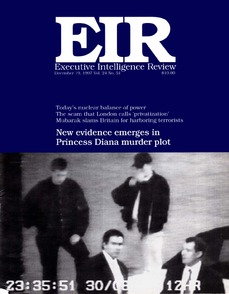Political Economy
The scam that London calls ‘privatization’
by Dennis Small
During 1988-97, desperately indebted Third World and former Soviet bloc nations were forced to sell off nearly a quarter-trillion dollars’ worth of state-held assets, in order to try to pay off their foreign debts and to cover their growing government budget deficits, promoted as a key component of the “new world order” by the International Monetary Fund.
Mont Pelerin, Thatcher, and privatization
by Allen Douglas
Mexico’s ‘highway’ robbery
by Carlos Cota Meza
Forced to privatize many highways, the government may now re-nationalize them, and speculators are making a killing.
Departments
Editorial
Bankrupt the gold speculators.
Investigation
New evidence emerges in Princess Diana murder plot
by Jeffrey Steinberg
Photographs published, for the first time, in this issue of EIR, may shed further light on the murder.
Crown makes strategic blunder, deploys Rowland against Al Fayed
by Allen Douglas
Allen Douglas examines the pedigree of Roland Walter “Tiny” Rowland, the former boss of the British multinational Lonrho.
Economics
Asian financial meltdown puts LaRouche center stage
by Marcia Merry Baker
The IMF’s efforts to bail out Korea and other bankrupt financial systems, are having about as much beneficial effect as hosing down a fire with gasoline. In this crisis, LaRouche’s solutions are under intensive scrutiny.
The bigger they get, the harder they’ll fall
by John Hoefle
A global banking consolidation is under way, in which banks are racing to become giants, in the vain hope that they will somehow become too big to fail.
Dangerous concessions granted to anti-science globalists in Kyoto
by Marsha Freeman
British globalist plans to subject national economies to UN system diktat, took another step forward, because no one challenged the fraud of “global warming.”
Business Briefs
Strategic Studies
Today’s Nuclear Balance of Power
The Wells of doom
by Lyndon H. LaRouche, Jr.
Even as the post-1989, globalized financial system is now settling into the watery abyss, most people are still clinging to “a delusory faith in an ‘unsinkable utopia,’ in an ‘eternal, neo-Malthusian, information society’s’ economy,” writes Lyndon H. LaRouche, Jr. The problem, he explains, are those diseases spread throughout the United States by oligarchical publicist H.G. Wells.
Wriston hails advent of ‘information standard’
Citibank Chairman Walter Wriston is lauding the replacement of “money” with “E-cash,” and the inauguration of a new “information standard.”
Wells et al., in their own words
Quotes from H.G. Wells, Leo Szilard, and Bertrand Russell show how blatantly they organized for a one-world government, ruled by the threat of nuclear terror.
International
Mubarak slams London for harboring terrorist groups
by Joseph Brewda
“I do not understand, why people on whose hands there is blood, are granted asylum in England. Why they are being granted the freedom to call, in interviews and newspaper articles, for the assassination of people who think differently,” Egyptian President Hosni Mubarak said.
Islamic Group praises Britain, condemns U.S.
From an interview with Islamic Group leader Yassir al Sirri, and his sidekick, Mohammed al Masari.
Mubarak: Toshka Project opens way toward ‘new civilization’ in Egypt
by Marcia Merry Baker
President Mubarak’s stress Toshka Project, as a counter-perspective to terrorism, throws a new spotlight on the fact that over the past two decades, this kind of economic development approach in Egypt has been deliberately thwarted by the IMF.
International Intelligence
National
Kennedy-Gephardt initiative won’t remobilize party base
by Suzanne Rose
Two leading Congressional Democrats, Rep. Richard Gephardt and Sen. Ted Kennedy, are talking about a strategy to remobilize the party’s traditional base. But the measures they are proposing now, are a retreat from their own proposals during the 1996 Presidential campaign.
National News



